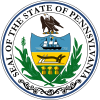The Pennsylvania Portal Pennsylvania (/ˌpɛnsɪlˈveɪniə/ , lit. 'Penn's forest country'), officially the Commonwealth of Pennsylvania (Pennsylvania Dutch: Pennsylvanie), is a state spanning the Mid-Atlantic, Northeastern, Appalachian, and Great Lakes regions of the United States. Pennsylvania borders Delaware to its southeast, Maryland to its south, West Virginia to its southwest, Ohio and the Ohio River to its west, Lake Erie and New York to its north, the Delaware River and New Jersey to its east, and the Canadian province of Ontario to its northwest. Pennsylvania was founded in 1681 through a royal land grant to William Penn, the son of the state's namesake. Prior to that, between 1638 and 1655, a southeast portion of the state was part of New Sweden, a Swedish Empire colony. Established as a haven for religious and political tolerance, the colonial-era Province of Pennsylvania was known for its relatively peaceful relations with native tribes, innovative government system, and religious pluralism. Pennsylvania played a vital and historic role in the American Revolution and the ultimately successful quest for independence from the British Empire, hosting the First and Second Continental Congress, leading to the adoption of the Declaration of Independence and the formation of the Continental Army. On December 12, 1787, Pennsylvania became the second state to ratify the U.S. Constitution. The bloodiest battle of the American Civil War, at Gettysburg over three days in July 1863, proved the war's turning point, leading to the Union's preservation. Throughout the late 19th and 20th centuries, the state's manufacturing-based economy contributed to the development of much of the nation's early infrastructure, including key bridges, skyscrapers, and military hardware used in U.S.-led victories in World War I, World War II, and the Cold War. Pennsylvania's geography is highly diverse. The Appalachian Mountains run through the center of the state; the Allegheny and Pocono mountains span much of Northeastern Pennsylvania; close to 60% of the state is forested. While it has only 140 miles (225 km) of waterfront along Lake Erie and the Delaware River, Pennsylvania has the most navigable rivers of any state in the nation, including the Allegheny, Delaware, Genesee, Ohio, Schuylkill, Susquehanna, and others. (Full article...) This is a Featured article, which represents some of the best content on English Wikipedia..
The Liberty Bell, previously called the State House Bell or Old State House Bell, is an iconic symbol of American independence located in Philadelphia. Originally placed in the steeple of Pennsylvania State House, now known as Independence Hall, the Liberty Bell today is located across the street from Independence Hall in the Liberty Bell Center in Independence National Historical Park. The bell was commissioned in 1752 by the Pennsylvania Provincial Assembly from the London-based firm Lester and Pack, later renamed the Whitechapel Bell Foundry, and was cast with the lettering "Proclaim LIBERTY Throughout all the Land unto all the Inhabitants Thereof", a Biblical reference from the Book of Leviticus (25:10). The bell first cracked when rung after its arrival in Philadelphia, and was twice recast by local workmen John Pass and John Stow, whose last names appear on the bell. In its early years, the bell was used to summon lawmakers to legislative sessions and to alert citizens about public meetings and proclamations. (Full article...)Selected geography article - The Pocono Mountains, commonly referred to as the Poconos (/ˈpoʊkənoʊz/), are a geographical, geological, and cultural region in Northeastern Pennsylvania. They overlook the Delaware River and Delaware Water Gap to the east, Lake Wallenpaupack to the north, Wyoming Valley and the Coal Region to the west, and the Lehigh Valley to the south. The name Pocono is derived from the Munsee word Pokawachne, which means "Creek Between Two Hills". Much of the Poconos region lies within the Greater New York–Newark, NY–NJ–CT–PA Combined Statistical Area. The wooded hills and valleys have long been a popular recreation area, accessible within a two-hour drive to millions of metropolitan area residents, with many Pocono communities having resort hotels with fishing, hunting, skiing, and other sports facilities. (Full article...)Selected image -Did you know -
Related portalsWikiprojectsThis is a Good article, an article that meets a core set of high editorial standards.
The Battle of Gettysburg (locally /ˈɡɛtɪsbɜːrɡ/ ) was a three-day battle in the American Civil War fought between Union and Confederate forces between July 1 and July 3, 1863, in and around Gettysburg, Pennsylvania. The battle, which was won by the Union, is widely considered the Civil War's turning point, ending the Confederacy's aspirations to establish an independent nation. It was the Civil War's bloodiest battle, claiming over 50,000 combined casualties over three days. In the Battle of Gettysburg, Union Major General George Meade's Army of the Potomac defeated attacks by Confederate General Robert E. Lee's Army of Northern Virginia, halting Lee's invasion of the north and forcing his retreat. (Full article...)Selected article -The President, Directors and Company of the Bank of the United States, commonly known as the First Bank of the United States, was a national bank, chartered for a term of twenty years, by the United States Congress on February 25, 1791. It followed the Bank of North America, the nation's first de facto national bank. However, neither served the functions of a modern central bank: They did not set monetary policy, regulate private banks, hold their excess reserves, or act as a lender of last resort. They were national insofar as they were allowed to have branches in multiple states and lend money to the US government. Other banks in the US were each chartered by, and only allowed to have branches in, a single state. Establishment of the Bank of the United States was part of a three-part expansion of federal fiscal and monetary power, along with a federal mint and excise taxes, championed by Alexander Hamilton, first Secretary of the Treasury. Hamilton believed a national bank was necessary to stabilize and improve the nation's credit, and to improve handling of the financial business of the United States government under the newly enacted Constitution. (Full article...)Pennsylvania news
CategoriesState factsState Facts
State symbols
Pennsylvania topicsGeneral imagesThe following are images from various Pennsylvania-related articles on Wikipedia.
Associated WikimediaThe following Wikimedia Foundation sister projects provide more on this subject:
Discover Wikipedia using portals |

































































